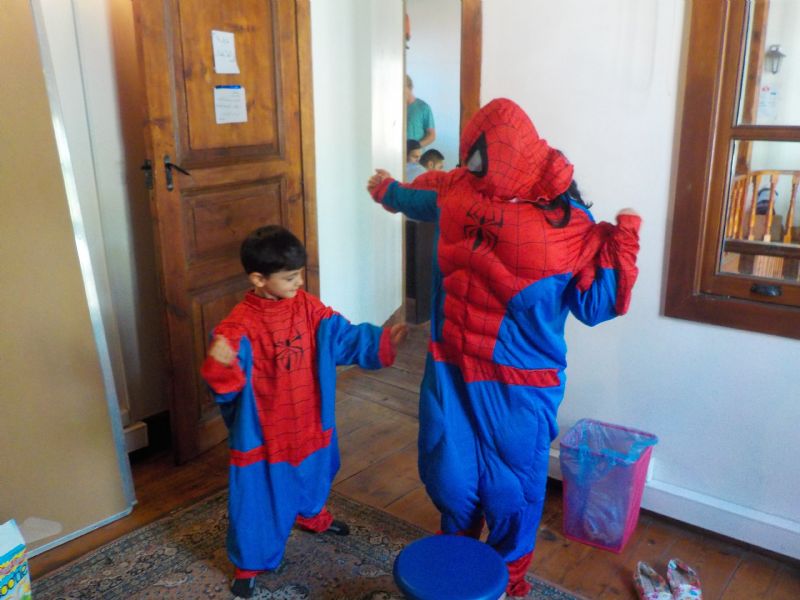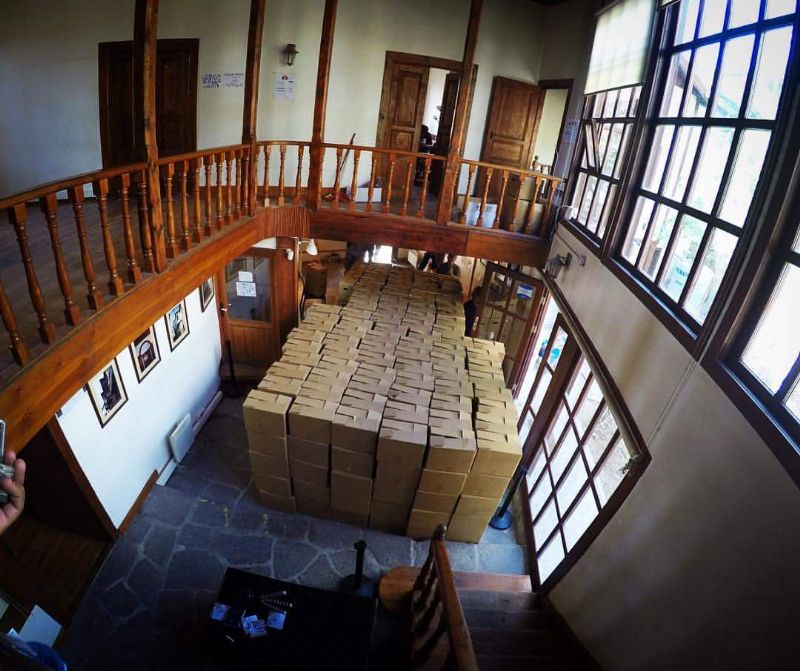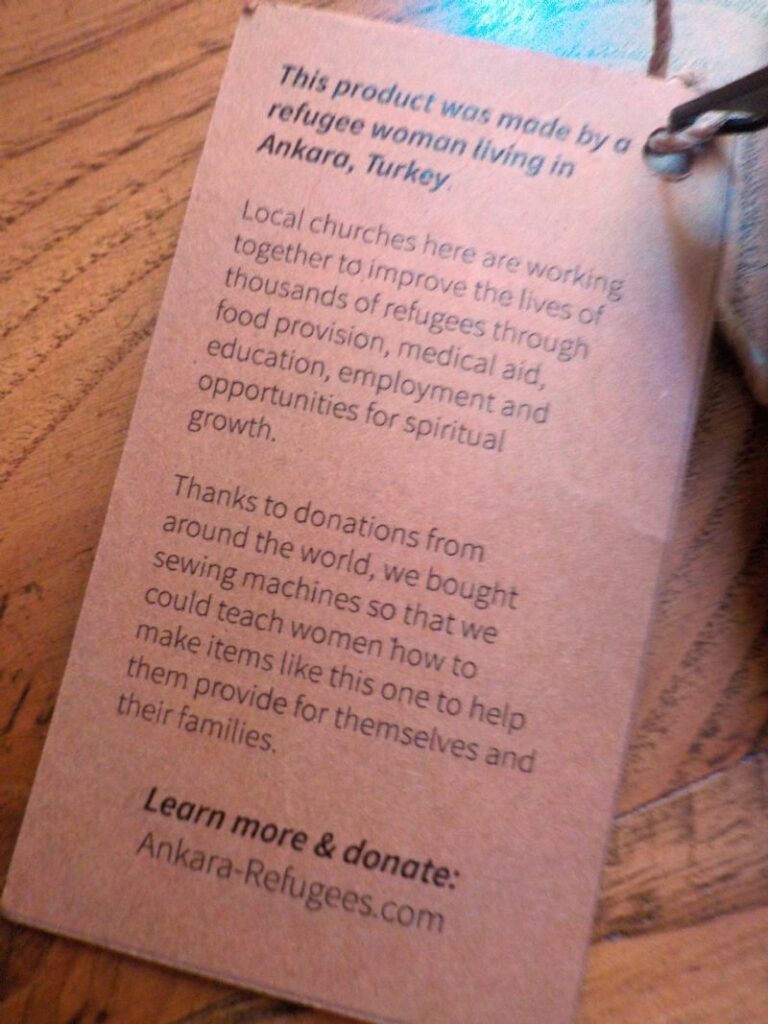This month, I had the privilege of going to Turkey, and while there, I came face to face with refugees displaced because of the Syrian Civil War. Before going, I can’t say my knowledge of their situations was little more than a set of assumptions.
It’s one thing to imagine the horror of thousands of people being driven out of their homes in the middle of the night, fleeing for their lives, carrying nothing and yet, because their family is with them, everything. It’s one thing to imagine hundreds of people desperately boarding rafts to cross a sea they’ve never traveled before with little knowledge of how rough the waters are, how far across it is or what awaits them on the other side. It’s one thing to imagine countless of husbands and wives and children and grandparents separated from one another for weeks or months, left having to guess the others’ fate and losing hope daily.
But it’s something else to see these people. To hear their voices. To be in the same room as them. To play with the kids. To converse with them.

One of our Iraqi friends who also helps out at the refugee center decided to pal around with this young refugee from Syria. The little boy kept jumping around yelling, “Spiderman! Spiderman!”
I am very guilty of being among the population who moved on quickly after the refugee crisis first became an issue. Sure, I kept up with some of it because I knew working with refugees was a possibility on the World Race. But even then the severity and consequences of the situation were pushed out of my mind by other breaking news of domestic attacks. I forgot, but places like Greece, Turkey and Egypt couldn’t and won’t. Hundreds of thousands of people fled to these neighboring countries and these places will be forever changed because of it.
I doubt I could ever forget about them now, too. After helping volunteer at a refugee center in Ankara, I would have to work really hard to erase these faces from my mind’s eye.
Over 5500 refugee families (that’s just over half of the total number of refugees the United States of America agreed to accept into our whole country) are registered at this relatively small, 2-story, back street office and are provided medical services, boxes of baking/cooking goods, clothes, a place where their kids can enjoy themselves and prayer once a month.

In May of 2015, the center opened and offered help to 5 families. One week later, that number became 14 families. The numbers of families they registered at one time, according to one of our contacts at the office, have basically tripled since the beginning.
The families registered there are all Iraqi and Syrian Muslim refugees who have been forced out of their homes by Syrian military troops, including the well-known religious extremist group ISIS (Islamic State of Iraq and Syria). ISIS is, according to CNN in an article updated August 11th of this year, arguably the most successful military group ever, taking over entire cities and regions in the name of Islamism (a political Islam).
On the second day we helped at the office, myself and two friends were assigned to the clothing room. We were to write down people’s numbers at the door, encourage them to be mindful of the number of items they could take, offer them a bag when they were done looking and organize the remaining clothes every so often.
The first hour went by like a blur. Women in black, full-length coats, dark shoes and head coverings bustled in and out in an attempt to get the higher quality items. Almost all of them spoke Arabic, some spoke Turkish, and so communication happened through repeated head nods, shakes and grunting noises. But it all happened so quickly, if you weren’t looking hard and trying to be more relationally oriented than task oriented, you’d miss a lot. And that was me. I was missing a lot. I was glossing over the people like I had been before.
But during the second hour, when the scene was not as crowded, a mother and her daughter slowly made their way to the door of the room. I don’t know who they were, what number was on their card (every refugee had to show us a card with a number they had been given upon registering at the office), what country they were from or anything else about them. I don’t have a relationship with these two people. I hardly spoke to them at all. I could have skipped over them too, except that my eyes simply could not look away from the little girl.
I didn’t see her at first. She was hiding behind her mother, but when encouraged by her mother to be seen, I was transfixed by her. I saw a timid, 4 or 5-yr-old girl with a blue shirt and dark colored stretchy pants. Her white Velcro sneakers were a little too big for her, and her thin, dark brown hair was pulled up into a lopsided pony tail on her head. One hand she hovered close to her mouth and chin at all times, ready to grab Mom at a moments’ notice. She kept her head down.
My teammate, Rosie, and I bent down, smiled and waved at her. But her big, deep brown eyes communicated skepticism and solemnity. She turned her head and then her body and buried her worries in her mothers’ black, floor-length coat.
I continued to watch her, now curious about her life, about her past, the things she’d seen. I grew more and more melancholy the longer I watched her.
The refugees being helped that day included those first 300 who registered over 1 year ago as well as 100 from the most recent sign-up. Which group this girl and her mother were a part of, I didn’t know. She could have already spent at least 1 year living in Ankara or she could have just gotten here.
Remembering this, I gazed on. She began to rub her tired eyes with her already-raised left hand. Oh what has your life been like, honey?
They left shortly after. But this girl is seared into the memory foam of my mechanical heart. I think God jerked me awake when she walked out from behind her mother. Sorrow, vexation, worry, fear. All vivid characters she has likely met face-to-face. And she’s 5 at the most.
I wonder if you will remember this, love. Will you grow up feeling lost and alone in a country you know you weren’t born in? Do you feel even pinch of hope? I cannot relate, I know. But you have shocked me out of a trance. An image of innocence marred by terror. God, let this not be her life’s legacy!
I heard in a sermon recently how there is a time and a place for facts, for “should have”s and “ought to”s, for teaching moments and opportunities to correct. All of these are necessary for helping us heal and progress and, for the Christian, to become more Christlike. We need instructors and, if we’re being honest with our humanity, correction. But I am convinced the best thing I could have done to help that little girl in that specific moment was this: to see her. To feel for her. To imagine the sounds and sights and smells her little life has known, to take her cares upon me and bear her burdens with her. Instead of being told “this is how you fix your weariness” or even “this is how you accept Jesus”, she needed a sympathizer. She needed my heart and prayers.
Of course I really have no clue what her life has actually been like. I don’t even know if she has burdens I can bear – painful memories, fear-filled nights, fragile trust. She might have been just fine in reality, and I never would have known. But what she did for me in getting me out of my mind was worth the possibility of me being wrong.
Ministering to refugees is still just as big a deal now as it was when the world news outlets released the image of the little boy’s dead body that washed up on the shore of Turkey over a year ago. And what’s more, these individuals and families are going to have to wait 5-10 YEARS before the UN transfers them to another country.
5-10 years.
The system is that slow. So in the meantime, entire families are asked to settle down and make a living where they are at with minimal resources and no knowledge of the language. And in case you were still wondering, smartphones don’t cut it.

A tag from one of the handmade bags refugee women made. The center currently employs 4 women in this program and gives them marketable work experience and a way to provide for their families.
Reality is the organization we volunteered with is the only one in Ankara that does what they do. A refugee woman came to them one day saying “Ok, I know you can not help me right now, but is there another place I can go to in the city?” The organization did a citywide search for anything and came up with….nothing.
Reality is in the capital city of Turkey there are over 50,000 refugee families. And only 5,500 of them are being helped on a regular basis through a single office.
There’s something wrong here.
One tangible step you could take to help is to take a look at the following link and video and find a way to donate, pray more specifically or, even consider serving there yourself or as a church.
Click HERE to get to the organization’s page where they accept monetary donations for the food boxes they give out several times per week. Thankfully, a wealthy donor has agreed to match each donation up to $75,000 until October of this year so your $40 becomes $80. At $10/box, you’d be helping provide for 8 refugee families.
Below is an informational video about the refugee crisis. It does leave out key information, but does a very good job of visually giving a bird’s eye view of the whole pickle. I found it compelling.
I’m asking you, family and friends to reacquaint yourself with this situation, with these families, with these people who have hopes and fears and dreams that are just as legitimate as our own. Our world is interconnected and we have a responsibility to take care of each other. At the end of the day, if you feel so called, do something!
The refugee crisis will continue to be an important topic to me. I’m telling you this now. God’s love for these people and pursuit of them has taken on a tangible feeling inside myself, one I’m not even sure how to express fully. I just know that God used a wary, blue-shirted child with downcast, tired eyes to make me stop what I was doing and begin to comprehend the weight of this devastating global problem. He gave “refugee” a face.








